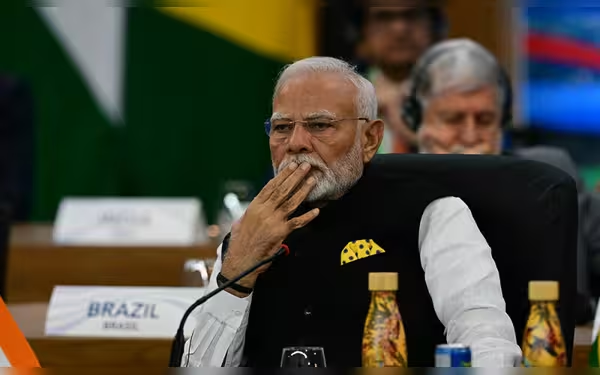Thursday, November 21, 2024 11:18 AM
Modi's Farm Policies Face Backlash Ahead of Maharashtra Elections
- Farmers dissatisfied with Modi's recent agricultural measures.
- Opinion polls suggest opposition parties may reclaim Maharashtra.
- Rising inflation impacts farmers' livelihoods and voting sentiments.
 Image Credits: brecorder
Image Credits: brecorderModi's agricultural policies face scrutiny as farmers express dissatisfaction ahead of Maharashtra elections, impacting inflation and voting sentiments.
In recent months, Indian Prime Minister Narendra Modi has implemented several measures aimed at supporting farmers, yet these actions have also contributed to rising inflation. As the election in Maharashtra approaches, the effectiveness of these measures is being put to the test. Maharashtra, a state known for its significant agricultural output, including sugarcane, soybean, cotton, and onions, is facing a critical moment. Opinion polls indicate that Modi's Bharatiya Janata Party (BJP) may struggle to maintain control over the local legislature, as many farmers feel they have not yet reaped the benefits of the government's recent initiatives.
According to a recent opinion poll conducted by Lok Poll, which surveyed over 86,000 individuals in Maharashtra, a coalition of opposition parties, including Congress, could potentially reclaim the state with up to 162 out of 288 seats. The poll highlights that low prices for essential crops like soybean and cotton are significant concerns for farmers. Other surveys echo this sentiment, suggesting that the BJP alliance could face a loss in the upcoming election, with votes set to be counted on November 23.
Modi's government faced backlash during the national elections held between April and June, where they lost their parliamentary majority. This decline was partly attributed to farmers' dissatisfaction with export restrictions that prioritized domestic consumers over growers, keeping local prices low. In Maharashtra, opposition parties secured two-thirds of the parliamentary seats during that election, indicating a shift in voter sentiment.
Devendra Fadnavis, a senior BJP leader and the deputy chief minister of Maharashtra, acknowledged the party's setbacks at a recent election rally. He stated, "We faced a setback during the parliamentary elections because of the restrictions on onion exports. We have now lifted those curbs, and Prime Minister Narendra Modi’s government will not impose export bans abruptly." This statement reflects the government's attempt to regain the trust of the farming community.
In a bid to support local farmers, India has lifted export restrictions on rice and onions and increased tariffs on imported edible oils. These measures aim to provide better prices for local growers of mustard and soybean. However, many farmers argue that these actions have come too late. They had already harvested and sold their produce, such as onions, to traders who are now profiting from a surge in domestic prices.
Retail inflation in India reached its highest level in 14 months in October, driven by soaring prices of edible oils, onions, and tomatoes. Farmers like Mahesh Gore from Nashik district expressed their frustration, stating, "When we were selling onions in March and April, the government didn’t allow exports. We were forced to sell onions at 10 rupees per kg. If they had allowed exports then, we could have got double the price. Now prices are at 50 rupees, but only traders are benefiting." This sentiment is echoed by other farmers who feel neglected by the government's policies.
Moreover, farmers are struggling with low prices for crops like soybeans due to a global surplus. Mahesh Khade shared his experience, revealing that he is currently receiving only 3,900 rupees per 100 kg for soybeans, a significant drop from 4,600 rupees a decade ago. Meanwhile, the costs of diesel, fertilizers, and other essential inputs have more than doubled during the same period. Khade lamented, "They have ignored farmers’ interests," indicating a potential shift in his voting allegiance towards the opposition.
As the election draws near, the outcome will likely hinge on the farmers' sentiments and their perception of the government's actions. The situation underscores the delicate balance between supporting agricultural growth and managing inflation. With the stakes high, both the ruling party and the opposition must address the concerns of the farming community to secure their votes. The future of Maharashtra's agricultural policies and the well-being of its farmers hang in the balance, making this election a pivotal moment for the region.













